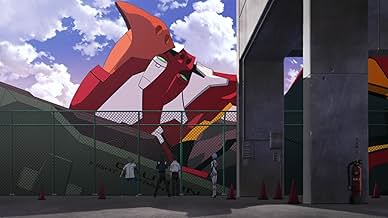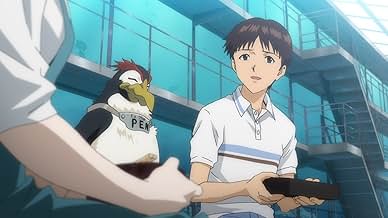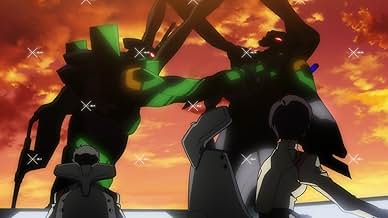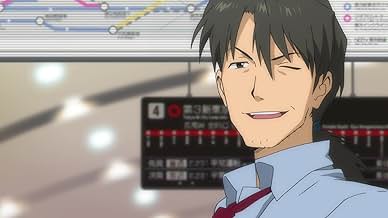In the face of increasingly bizarre and powerful Angel attacks, Shinji Ikari and his partner Rei Ayanami are assisted by two new pilots: the fiery Asuka Langley Shikinami and the mysterious ... Read allIn the face of increasingly bizarre and powerful Angel attacks, Shinji Ikari and his partner Rei Ayanami are assisted by two new pilots: the fiery Asuka Langley Shikinami and the mysterious Mari Illustrious Makinami.In the face of increasingly bizarre and powerful Angel attacks, Shinji Ikari and his partner Rei Ayanami are assisted by two new pilots: the fiery Asuka Langley Shikinami and the mysterious Mari Illustrious Makinami.
- Awards
- 1 win & 2 nominations total
- Shinji Ikari
- (voice)
- Rei Ayanami
- (voice)
- …
- Gendo Ikari
- (voice)
- Maya Ibuki
- (voice)
- Ryoji Kaji
- (voice)
- Makoto Hyuga
- (voice)
- Shigeru Aoba
- (voice)
- Kensuke Aida
- (voice)
- Toji Suzuhara
- (voice)
- Kiel Lorenz
- (voice)
- Hikari Horaki
- (voice)
- Kaworu Nagisa
- (voice)
- Additional Voices
- (English version)
- (voice)
Featured reviews
A strong second entry in the Rebuild of Evangelion, even if I'm not 100% sold on some of the changes
The second film in Hideaki Anno's Rebuild of Evangelion, Evangelion: 2.0 You Can (Not) Advance covers the material from episodes 8-19 of the TV series but also is the part where the rebuild begins to veer away from its source material. A post credit scene in Evangelion: 1.0 You Are (Not) Alone showing the awakening of Kaworu Nagisa was a telling sign of Anno's intent on creating new spins on the series characters and would not be beholden to the layout as presented in the original series. While the characters remain mostly intact, Anno takes them through different directions story wise as well as expanding and adjusting the character and story progression to meet the needs of feature film format. For the most part the movie does this very well, but there are a few hiccups in the translation.
If there's a central theme present in You Can (Not) Advance, it's in Shinji's relationship with his father, Gendo. The story begins proper with Shinji and Gendo visiting Yui Ikari's (Shinji's mother and Gendo's wife) grave, it effectively establishes the dynamic in Shinji and Gendo's estrangement with Shinji having processed his grief with feelings with isolation, inadequacy and worthlessness, and Gendo having sever ties to things he considers "frivolous" down to the fact Gendo has discarded any photos or mementos of Yui's existence which is yet another point of unspoken contention in their relationship. Shinji's complicated relationship with his father is further examined via his relationships with characters such as Asuka and Rei, who both give their input to Shinji in different ways. Asuka's abrasive personality is mostly in tact here, but admittedly it has had its edges softened in comparison to the TV series with remixes on scenes such as her sleeping in Shinji's room now with added exchanges including Asuka exhibiting a greater level of vulnerability in not just this scene, but also a remix of the elevator scene with Rei.
While the movie mostly gets the major story developments right and the new elements presented are mostly unintrusive, there are some stumbling points that I was disappointed by. For those familiar with the original series, the two most horrific scenes by far from that show involved were in regards to episodes 18 and 19 with Eva Unit 1's brutal evisceration of Angel hijacked Eva Unit 3 or Eva Unit 1's devouring of the Angel Zeruel. While both scenes are still present, the soundtrack choice of what sounds like a children's choir in place of the original score doesn't fit all that well and I found it had the effect of lessening the impact of these sequences. In the case of the Zeruel scene there's also been a major change for the sake of I guess making it feel like a suitable ending climax which I suppose makes sense to a degree, but I'm not sure where I fall on liking or disliking the direction.
Evangelion: 2.0 You Can (Not) Advance continues Anno's Rebuild of Evangelion revisiting and remixing elements with contemporary polish and designs. While the character dynamics are on point with some good expansions on Shinji's relationships with Rei and Asuka in particular yielding some strong emotional pathos, certain presentational decisions I felt called attention to themselves and lessened their impact. Overall Evangelion: 2.0 is a worthy entry in the series and makes for satisfying if flawed viewing for series veterans and franchise newcomers.
You Can (Not) Advance does take the series into a completely new direction and actually changes situations that fans of the original series are familiar with for the better and actually drops the angsty over-philosophical dribble that hurt his original engaging creation. Characters develop new relationships and interact differently from the show. The three EVA pilots from the original series get some great development here and differ a lot from NGE in a very good way. New characters are introduced, stakes are raised and the film has a lot of build up which boils down to one hell of a climax.
The film has a more intense tone this time around and is very fast paced. The action is incredibly engaging and the film is the first in a while that has gotten my heart beating like crazy during the intense action on-screen. The film does give you breathing space with lighthearted interactions between characters and humor and thus makes it less heavy overall than NGE and EOE even though it certainly is more gruesome and still has it's moments of pure nightmare fuel.
The Score of Evangelion is at it's best in this film and truly delivers. It varies from beautifully orchestrated racing score to sweet and engaging J-pop and Anno sure makes the out-of-place songs fit as well as he did in the show and EOE. The entire experience watching this addition to the series is unforgettable and gives me much hope for even more improvement in the next two installments.
Overall the film is a vast improvement for the series and hints at better things to come with it's significant changes and has raised the stakes for the Evangelion universe. Anno seems to have gotten over his depression completely and bloomed into a true crafter of worlds and emotionally charged storytelling.
Here, we're treated to a scene that's brand new. Where the first film followed the series with about 80% accuracy, from the get-go here we're treated to a major change, and a greater split starting around halfway through. This is where the rebuilds begin to lift the curtain, and slowly unravel where the series is going. I really liked it.
The animation here is gorgeous. 3D for the machinery and logistical aspects of the city allow them to show a lot more than the original series. And the 2D elements on top blend in very well. It's not the 90s anymore, the merging of styles looks great.
However the new character that's introduced is rather shallow. She's interesting retroactively, but she still marred my first viewing experience. I didn't really understand why she was taking over character actions from the original series-actions that could be done by the actual original characters within this very film. But it was really the only slight on the story (excluding the convoluted nature that's just an Evangelion trademark at this point).
Overall, this film justifies the rebuilds existence much more than the first one. It's what I've come to expect when an original creator revisits an earlier work. I want to see their adaptation of what they want to show after having grown, and maturing.
There's a similar instance with the Final Fantasy VII remake. If it's the original writer/s, let them shake things up. It's much more interesting.
I don't like the fact than Anno Hideaki has been able to milk the somewhat unfinished series for so much cash and so many editions (not to mention pachinko machines) so far, but taking 1.0 and 2.0 as stand-alone works (and ignoring their pretentious titles) is pretty satisfying.
Story 8/10 Good: much more than a rehash of the series. The story is fleshed out in some of the most necessary places and feels so much tighter and more concentrated than anything that has come before. Some awesome new snippets of what is to come later in the series add some satisfying excitement.
However, there is still an element of "here comes the next baddie" which gets a little tiresome. It is dealt with much more effectively here than the series, but it's still predictable. Nevertheless, despite giving the impression of being about to enter the full-on "monster of the week" barrage, it never really does, which is a blessed relief. The interactions of the characters are becoming more believable, and individual personalities are being better exposed and explained.
But, and it's a necessary but, what's the deal with the fan-service? Come on, man. Take yourself seriously, won't you? Animation 9/10 Well, it teetered between absolutely superb and a little disappointing. The budget was clearly insanely high. Action sequences are fantastically detailed and choreographed for the main part, although suffer from gratuitous flailing of limbs and ridiculous acrobats which unfortunately dumb it down a little. Backgrounds are simply amazing. The detail and range is incredible. The failings lie in the characters. Sometimes character faces and expressions look out of place by their simplicity. The broad pen pines and over-simple shading are a bit of a let-down.
Sound 7.5/10 Not particularly amazing. Again we see the technique of using a mixture of classical and children's music for depth and vulnerability. I'm surprised at some of the choices though. For example, one of the children's songs used is very popular in Japan and often used in elementary schools. The manner in which it is normally used makes its appearance in the film almost comical; which can't have been the intention. Not really knowing many Japanese people who care that much about anime I haven't been able to ask what they though, but it seemed a bit silly to me.
The Japanese people speaking English throughout the film are incredibly embarrassing. What a huge mis-calculation. How hard is it to train people to say a small number of lines in a natural way? Characters 8.5 Although some of the characters (particularly Asuka) seem to have become even less likable, for the most part the big-hitters have only improved. Although there is little time left for the minor-characters to develop or even really be involved, the well-developed personalities of the leads take somewhat new directions in their relations to one another. The relationship between teen-sap Shinji and his father has a more satisfying and somewhat relatable edge to it now, and Rei's annoyingly hyperbolic meekness has been flatted out to something more forgiving. All in all, satisfying.
And the new lead, Mari, is much better than (at least I) predicted. She has a very interesting relationship with herself, and pain. I am definitely looking forward to her future development.
Eva designs seem to have changed slightly around the waist which was a curious choice, and doesn't add much to their attractiveness. In contrast, the Angels have been changed for the better. The old, sometimes Ultraman-ish designs were sometimes a little... Ultraman-ish. The reduced number and better designs have helped things along well.
Overall 8.5/10 Overall satisfying. For me the film didn't quite have the intensity ascribed to it by others, and the ending I thought actually lacked a little emotional attachment. I also thought that the amazing animation and choreography discussed above wasn't nearly as good near the end as it was earlier in the feature. But despite this, as a whole this movie blows the series out of the water. So much which was unsatisfactory is now shiny and new. Whether or not I would feel this way about the film without having seen the rest of the franchise is anyone's guess, but I really enjoyed it. Good work, keep it up.
Evangelion 2.0: You Can (Not) Advance (or 2.22 depending on the version you saw) is the most successful interpretation of Evangelion thus far. While the first remake film 1.0: You Are (Not) Alone felt much like a mere recap of the first six episodes of the series, the second film takes a different approach and reaches a remarkable level of success. Everything is smoother, more refined and simply better.
The animation is gorgeous. The plot is more understandable. The characters are actually all likable this time. Many elements of the story are different, and the pretentious biblical gibberish seems to have taken a back seat. There is also warmth that was largely missing in the series: the characters seem to be genuinely content with their lives. Shinji isn't constantly mumbling about hating himself. Rei isn't a completely emotionless robot. Even Gendo seems more human. As a very small, but important detail we see his eyes through his shades far more than in the series, which may not sound like much, but it really makes a difference if you've watched the series.
The story remains mostly the same. The events cover mostly what happens in the episodes 7-19 of the series, but with all the filler cut out. Only the most meaningful angel battles are left. Instead of feeling episodic like the first film, 2.0 actually feels like a proper movie with appropriate highs and lows and character development, culminating in a huge climax which is one of the most exciting action sequences ever seen in animation.
The animation is top of the class. The level of detail is simply eye- popping, especially when watched in HD. With the help of CGI the angel battles look cooler than ever, and the evas are particularly impressive. The fairly simplistic characters are something of a letdown in comparison, but don't drag the overall presentation down.
The sound is also vastly improved from the series. The music this time is appropriately epic, matching the scale and size of the evas and angels. The voice acting is on par with the series with most of the original cast reprising their roles. The ending song, an acoustic version of Utada Hikaru's "Beautiful World" feels perfect for the film, as if letting out a sigh of relief yet still leaving the feeling there's more to come.
Yet there are still problems Evangelion can't seem to get rid of. The biblical imagery and names, though downplayed in this film, still feel somewhat goofy and superficial. Though the plot is more coherent, it still is very weird and it can be hard to grasp what exactly the big picture is. There is some weird dialogue and lines like "Do you hate pain?". Still, the rest of the film is good enough that the viewer is willing to overlook most of the flaws.
Evangelion 2.0 is the best interpretation of the series thus far, and it left me eagerly waiting for more. I recommend seeing the 2.22 version, as it gives more insight to the characters and story. Highly recommended for both fans of the series and newcomers alike.
Did you know
- TriviaIn the many changes that the original plot had, the most dramatic changes are: In the anime, when the girls are in an elevator, Asuka slaps Rei for their passivity, while in this film, she tries to slap her and Rei stops the slap with her hand. In the series, Shinji only threatens to destroy the Geo-front, in the film, he does manage to meet this threat and he is seen destroying part of the Geo-front. Toji's younger sister is seen fully recovered in the film, but in the series, the fate of her is never know. In the film, Asuka is much more open with Shinji. For example, the scene of the series in which she lies beside him, she falls asleep and Shinji moves away, but the film she stays in bed and they counted each other's fears, with greater harmony between them that at other times. In the series, when the EVA-01 match against Zeruel, EVA-01 goes into Berserk mode alone, while in the film, Shinji does so at their own will. In the the series the EVA-01 also rebuilds the lost arm with a piece of Zeruel's ripped body, while in the film, the EVA 01 creates a sort of "condensed energy arm" which is also used as "cannon momentum" against Zeruel.
- GoofsMari is supposed to be British, but in the scene where she speaks in English, the accent is American.
- Quotes
Unit-01 Dummy Plug System: [during start-up, in reverse] Freedom is an illusion. All you will lose is the emotion of pride. To be dominated by me is not as bad for human pride as to be dominated by others of your species.
- Crazy creditsAt the end of the credits, there is a scene where EVA-01 is pierced with the LLance of Longinus, thrown by Kaworu Nagisa piloting the Evangelion Mark.06, who says that he will show Shinji "true happiness."
- ConnectionsFollowed by Evangelion: 3.0 You Can (Not) Redo (2012)
- SoundtracksBeautiful World -PLANiTb Acoustica Mix
Performed by Hikaru Utada
Details
Box office
- Gross US & Canada
- $133,640
- Opening weekend US & Canada
- $84,157
- Jan 23, 2011
- Gross worldwide
- $41,780,025
- Runtime1 hour 52 minutes
- Color
- Sound mix
- Aspect ratio
- 1.85 : 1
Contribute to this page





























